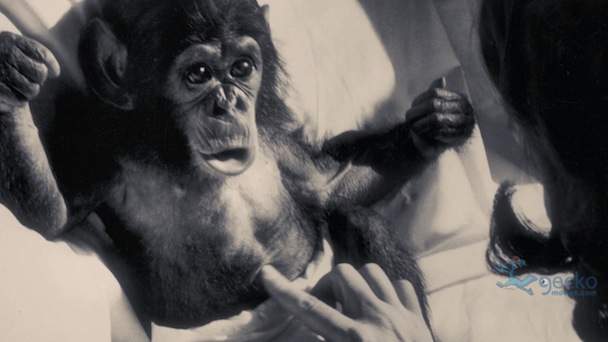Project Nim
A fascinating, unflinching and tragic documentary about the chimpanzee we tried to make human.
Overview
In 1973, Columbia University behavioural psychologist Herb Terrace embarked upon a radical scientific experiment: to raise a chimpanzee as a human child in an attempt to teach it sign language. The possibility that man might be able to communicate with another species was as exciting as it was unsettling, potentially redefining what it was to be human and directly challenging the prevailing theory that language was unique to homo sapiens.
So began Project Nim, named after its baby chimpanzee subject: 'Nim Chimpsky' (in a none-too-subtle jab at Noam Chomsky, the face of the linguistics establishment). In what would become a tragically recurrent and traumatising event in Nim's life, the newborn chimp was wrested from his mother's arms and given to bohemian grad student Stephanie LaFarge, a former pupil (and sexual partner) of Terrace. From day one LaFarge lovingly and enthusiastically raised Nim as one of her own children, even breastfeeding him for the first few months of his life. The footage from these early days of the project is utterly absorbing, with Nim's curiosity and playfulness as endearing as it is conspicuously 'human'. Add to that his rapid adoption and use of American sign language and you begin to feel like Terrace was indeed onto something absolutely remarkable.
Working against him, however, were numerous methodological failings and — more importantly — irrepressible animal instinct. For all her affection, LaFarge's permissive and unregulated approach to Nim's education proved too unscientific for Terrace, compelling him to again extract Nim and relocate the entire project to a sprawling country estate. Yet nothing could suppress Nim's unavoidable maturation into an adult chimpanzee. With the strength of five men, he became increasingly dangerous, eventually attacking one of his teachers with terrifying ferocity. Believing the research had faltered, Terrace immediately cancelled the project and returned Nim to captivity, where he was then sold into animal experimentation.
Directed by James Marsh (Man on Wire), Project Nim explores mankind's enduring fascination with our closest animal relatives and the ethically murky area of animal testing. If it all sounds terribly familiar, that's because it is. The recent critical acclaim for Rise of the Planet of the Apes lay not with the action-packed rebellion during the film's climax but rather with the compelling and intimate relationship between James Franco's character and Caesar, the chimpanzee he'd raised from birth in his home away from the laboratory. Both their friendship and Caesar's education rang eerily true, so much so that when Caesar ultimately spoke (redundant spoiler alert), it almost seemed plausible. These chimps, fictional and real, brought out the best and worst of mankind, demonstrating the undeniable and unsettling distinction between human and humane.





